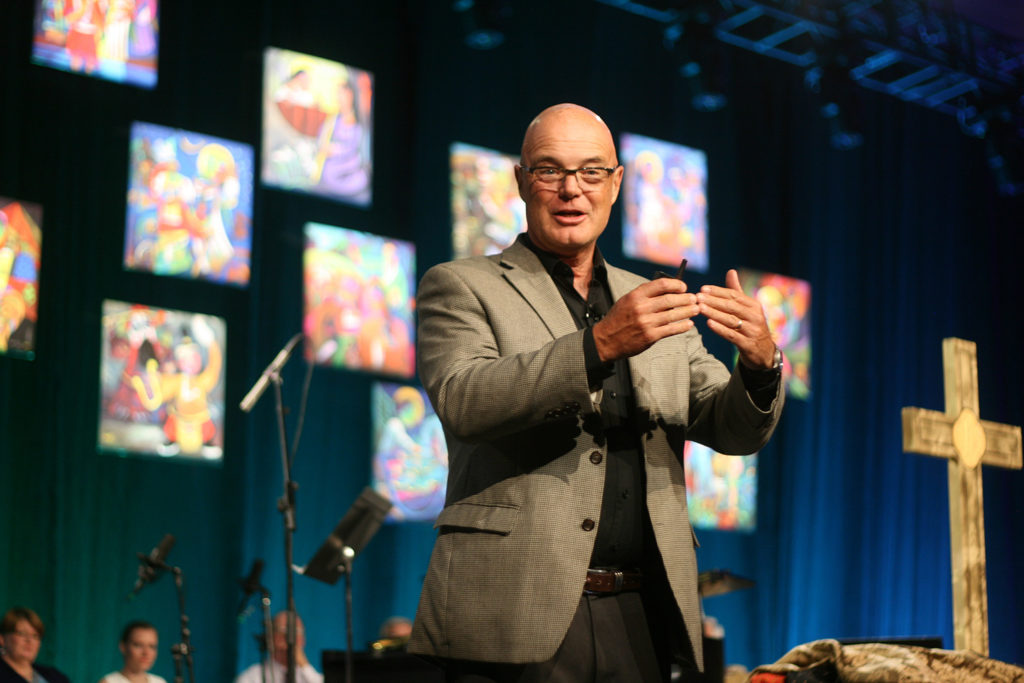Christians in the United States are rightly concerned about the rise of extremist groups like the alt-right, but they shouldn’t be so surprised, public theologian Brian McLaren said in a June 29 keynote address at the Cooperative Baptist Fellowship General Assembly in Atlanta.
McLaren, author of the recent book We Make the Road by Walking, urged Cooperative Baptists to ignore the criticism hurled at them in their early days that they were headed down a slippery slope away from the Christian faith.
“Western Christianity slid way, way down long before 1991,” McLaren said, tracing backward through history to the 1960s when Baptists were holdouts for segregation, to 1845 when they were defenders of slavery, and to 1492, when, as everyone learned in elementary school, “Columbus sailed the ocean blue.”
“Did you know in 1495 Columbus shipped 1,600 slaves alive?” he asked. “The history of our country long before CBF was formed was steeped in injustice.”

Brian McClaren speaks at the CBF General Assembly. (CBF photo)
When Christopher Columbus “discovered” America, McLaren said — in reality he was discovered by people who were already there — the explorer had failed in his mission to find a cheaper trade route to import spices to Europe from the East Indies.
“He found out he could take slaves home instead.”
Columbus deemed it moral in “the name of the Holy Trinity” to capture as many inhabitants of the New World as possible and sell them into slavery. “Although they are living things, they are as good as gold,” Columbus wrote.
McLaren said Columbus was empowered by the Doctrine of Discovery, embraced by the Roman Catholic Church of his day but seldom acknowledged by white Christians today. Pope Nicholas V first articulated the doctrine in a papal bull in 1452 affirming the idea that Christians have a right sanctioned by God to conquer non-Christian lands and control their inhabitants.
The pope urged the conquistadors to obey Christ’s Great Commission by going into the world to “invade, search out, capture, vanquish and subdue all Saracens and pagans,” to “reduce their persons to perpetual slavery” and “to convert them to his and their use and profit.”
“Saracens” is a medieval term for Arabs that by the 15th century had become a synonym for Muslims.
“When Christians today say, ‘Why do they hate us?’ this is part of the answer,” McLaren said.
“Five centuries ago starts this thing called white Christian supremacy. People are surprised that there’s a resurgence of it now. It’s good that you’re surprised. It’s not good that you don’t realize it has a long history.”
“Nothing that ISIS is doing today was not done by the Christian enslavers and genociders in our history,” he said. “It is sad to say this, but it’s true.”
McLaren said there is a straight line between the Doctrine of Discovery and “the slaughter and genocide of the native peoples to the Trail of Tears to slavery of kidnapped Africans through to segregation through to Trayvon Martin and any number of other tragic deaths today.”
“In the next 25 years get that metaphor out of your mind,” he urged Cooperative Baptists. “It’s not like we were so great in 1991.”
The 2017 CBF General Assembly kicked off with a dinner June 26 celebrating the Fellowship’s 25th anniversary and success of a $12-million endowment campaign launched last June to support the long-term sustainability of CBF missions and ministries.
In a business session June 30 the assembly approved a 2017-2018 mission and ministry budget of $13.6 million and elected leaders including Gary Dollar of Glen Carbon, Ill., as moderator-elect.
The June 26-30 assembly included updates and discussion about an “Illumination Project” implemented after last year’s annual gathering to develop a model for seeking win-win solutions to divisive issues beginning with an existing CBF policy barring the hiring of missionaries or staff who are openly gay.
The assembly closed Friday night with a commissioning of the first four field personnel under a new funding model providing salaries, housing, benefits and administrative support from the CBF Offering for Global Missions. In May the Fellowship announced reductions in both the number of field personnel and Global Missions staff in the Decatur, Ga., headquarters due to a shortfall in the offering.
“We suffer not from a lack of God-given opportunity but a shortage of sacrifice,” Global Missions Coordinator Steven Porter told the assembly audience.
“We have prayed,” he said. “We have partnered, but we haven’t paid the bills.”
The 2018 General Assembly will be held in Dallas.
— With reporting by CBF communications.
Related story: In annual meeting do-over, Southern Baptists denounce ‘alt-right’ white supremacy
Related opinion: The great white backlash continues | Miguel De La Torre


